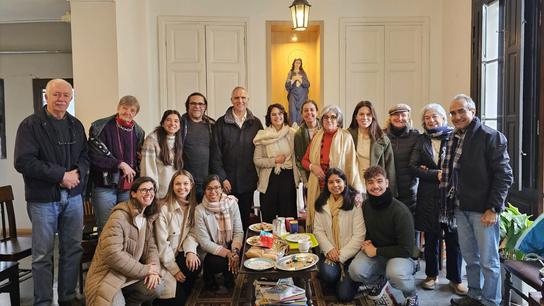Building Bridges of Hope: JRS Europe Director Alberto Ares SJ Strengthens Continental Solidarity During Visit to Argentina and Uruguay
24 February 2026
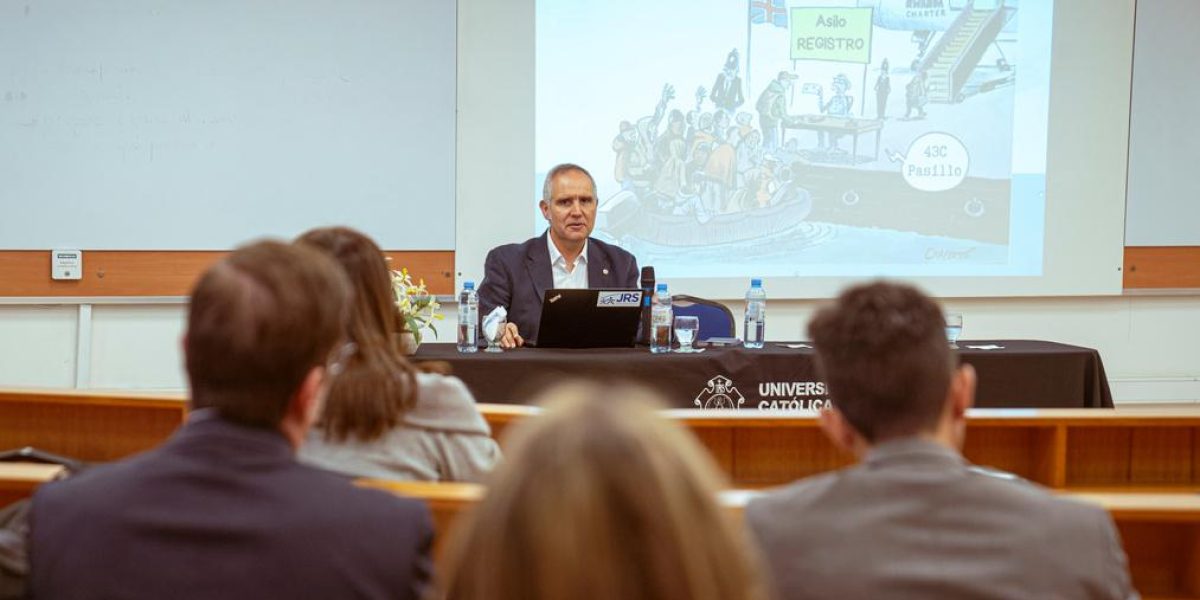
Alberto Ares SJ, Director of Jesuit Refugee Service Europe, recently embarked on a transformative journey to Argentina and Uruguay, fostering deep connections and enriching dialogue around hospitality as a fundamental response to forced migration. This visit brought together social, academic, ecclesial, and public policy actors across both nations, creating vital spaces for reflection and exchange centered on the construction of inclusive communities through the lens of hospitality.
A Mission of Shared Learning and Solidarity
The visit was orchestrated by the Jesuit Migrant Service Argentina-Uruguay (SJM ARU), reflecting the profound interconnectedness of the global Jesuit network in responding to migration challenges. As Director of JRS Europe, Ares brought invaluable insights from the European context while learning from the innovative approaches developed in the Rio de la Plata region.
The overarching theme of hospitality served as the unifying thread throughout all activities, conceptualizing it not merely as direct assistance to forcibly displaced persons, but as a comprehensive approach requiring institutions, legislation, and communities that enable dignified and rights-restoring welcome. This aligns perfectly with JRS Europe’s mission to work toward “a Europe where human rights, protection, hospitality, integration, and reconciliation all have a place to flourish”.
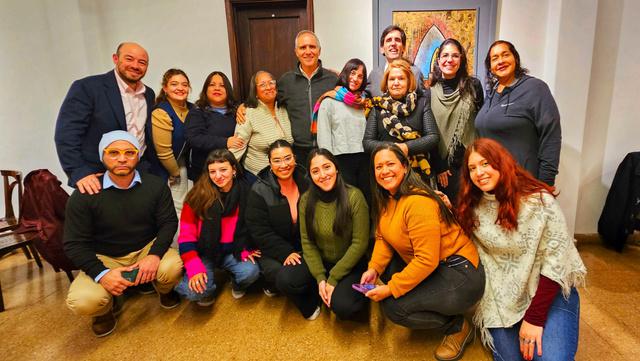
Buenos Aires, Argentina: Foundations and Faith Communities
The journey commenced in Buenos Aires with an intimate gathering of SJM’s specialized programs, including Infancias Migrantes (Migrant Children and Families), Dispositivos de Alojamiento Temporal (Temporary Housing Devices), Raíces Hermanas (Sister Roots), and Soy Refugio (I Am Refuge). This initial meeting established the groundwork for deeper discussions about practical hospitality in action.
The dialogue expanded through the conversatory “Vida consagrada al servicio de una hospitalidad que nos humaniza” (Consecrated Life in Service of Hospitality That Humanizes Us), which brought together representatives from various religious orders and congregations through CONFAR (Argentine Conference of Religious Men and Women). Participating religious congregations, alongside the Provincial of the Society of Jesus for Argentina and Uruguay and representatives from the Dicastery for Promoting Integral Human Development.
This gathering exemplified the synodal approach – characterized by listening, discernment, and shared searching – that has become central to contemporary Catholic social engagement. Ares shared his extensive pastoral and academic experience in accompanying migrants and refugees across diverse global contexts, enriching the conversation with insights from Europe’s complex migration landscape.
Córdoba: Academic Engagement and Theological Reflection
The University of Córdoba provided the setting for “(Re)pensar las migraciones en clave de hospitalidad” (Rethinking Migration Through the Lens of Hospitality). This academic symposium, hosted at the Universidad Católica de Córdoba with Rector Andrés Aguerre SJ, demonstrated the university’s commitment to addressing contemporary migration challenges through rigorous academic inquiry.
The panel featured distinguished voices including María José Caram from the Faculty of Theology, Manuel Ruiz Durán from SJM ARU and the Continental Jesuit Network with Migrants, and Nicolás Colombano from the Pedro Arrupe SJ Free Legal Service and the Archdiocesan Migration Pastoral. The moderation by Julio Villavicencio SJ (Director of SJM ARU and Social Sector Delegate for the Society of Jesus in Argentina-Uruguay) and María Orozco from the university’s Social Responsibility office ensured comprehensive dialogue.
The discussions addressed how hospitality emerges as an ethical and spiritual response to contexts marked by hate speech, restrictive policies, and disinformation. Participants explored how hospitality promotes empathy and recognition of migrants as protagonists of a more just society. This theological grounding resonates with JRS’s foundational understanding that “God in Jesus crosses the divide between divine life and human life”, making migration a fundamentally sacred journey.
Despite restrictive normative frameworks like the European Pact on Migration and Asylum, which deepens exclusion, the conversatory emphasized hospitality as a transformative alternative based on love, truth, and community. From pastoral and territorial perspectives, hospitality emerged as a mission of reconciliation that builds bridges between social and cultural sectors.
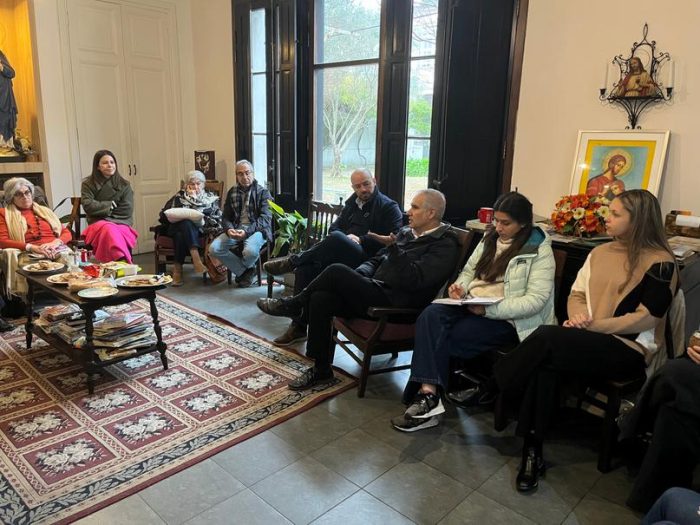
Buenos Aires: Partnership with Academic Excellence
The final Argentine event, “Hospitalidad y Migraciones: un diálogo desde el territorio” (Hospitality and Migration: A Dialogue from the Territory), took place at the Pontificia Universidad Católica Argentina (UCA). This culminating dialogue brought together Dr. Diego Ferreyra, Academic Secretary of the Faculty of Social Sciences; Fr. Juan Antonio Ramírez Romero, Secretary of the Episcopal Commission for Migration and Itinerant Pastoral and the Argentine Catholic Commission for Migration Foundation; and Julio Villavicencio SJ, with moderation by Clarisa Demattei, a distinguished political scientist and researcher at the International Studies Center.
The discussion centered on placing the person at the heart of migration discourse, recognizing “the face of Christ in encounters with migrants” beyond technical aspects. Participants acknowledged migration as a multicausal phenomenon with multiple effects and complexity, including the right to remain in one’s own territory. This holistic approach aligns with JRS Europe’s comprehensive methodology of accompaniment, service, and advocacy.
The gathering revisited Pope Francis’s four foundational verbs for migration ministry:
- Acoger (Welcome): Providing safe hospitality, covering minimum needs of arrivals
- Proteger (Protect): Guaranteeing rights that allow migrants to establish themselves with dignity
- Promover (Promote): Recognizing and fostering the capacities migrants contribute to new communities
- Integrar (Integrate): Ensuring active participation in social life as full subjects capable of contributing to the common good
These principles directly reflect the three pillars of JRS’s global mission: to accompany, serve, and advocate for refugees and forcibly displaced persons, demonstrating the coherent vision across the worldwide Jesuit network.
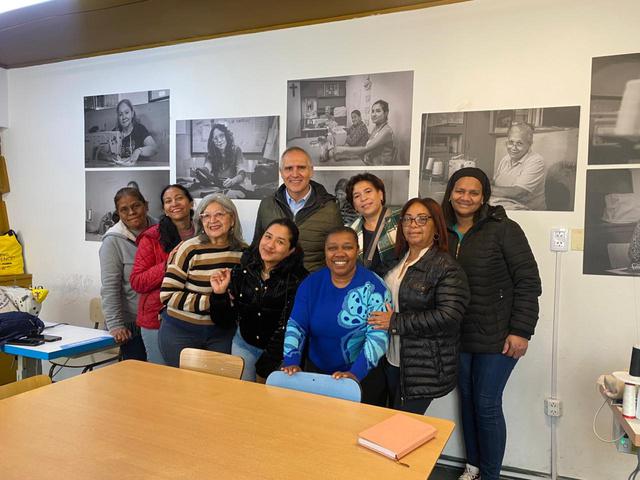
Montevideo, Uruguay: Critical Analysis and State Response
Uruguay’s engagement centered on the conversatory “Hospitalidad: una categoría crítica para nuestro tiempo” (Hospitality: A Critical Category for Our Time) at the Centro Cultural de España in Montevideo. This event featured Alberto Ares SJ alongside distinguished Uruguayan scholars Dr. Victoria Prieto (Demography, Faculty of Sciences, UDELAR) and Dr. Clara Márquez (Social Sciences, Faculty of Sciences, UDELAR).
The Montevideo dialogue positioned hospitality not only as a moral value but as a political practice confronting advancing discourses of hostility. Participants emphasized the necessity of solid institutional structures enabling dignified and sustainable welcome for migrants. Through analysis of data and theoretical frameworks such as documentary fragility and liminality, Uruguay’s development of dynamic state responses to migration irregularity was highlighted as distinguishing it from other regional countries.
The session concluded with reflection on Social Work with migrants, presented as a field of tensions and resistances. Professional intervention was characterized as not neutral, emphasizing that ethical and political commitment is fundamental for transforming realities, always working from listening, proximity, and a human rights-based approach. This analysis resonates with JRS Europe’s advocacy work, which monitors regional developments and assists national offices with policy positions.
Transformative Impact and Continental vision
Ares’s visit exemplified the Jesuit approach to global solidarity in migration ministry. His background brought European perspectives into dialogue with Latin American innovations.
The visit demonstrated how hospitality transcends borders while respecting local contexts. Uruguay’s dynamic state responses to migration challenges and Argentina’s comprehensive multi-sectoral engagement provided valuable models for European consideration. Simultaneously, European experiences with immigration detention, destitution, and border externalization offered important lessons for Latin American contexts.
Throughout the visit, Ares emphasized that “hospitality is not simply a moral disposition, but a passion that profoundly mobilizes and has been capable of changing lives”. This understanding aligns with JRS Europe’s commitment to accompaniment, which moves “beyond mere delivery of services through offering companionship, active listening and solidarity”.
Building Networks of Hope
The visit strengthened continental networks within the Jesuit Network with Migrants in Latin America and the Caribbean (RJM-LAC), while connecting these to European experiences through JRS Europe’s extensive 23-country network. This interconnectedness reflects the global nature of migration challenges and the need for coordinated responses that transcend national boundaries.
Ares’s presence in Argentina and Uruguay also connected with broader initiatives such as the “Caravan for Hospitality” – a continental tour promoting cultures of welcome and encounter that has journeyed through multiple Latin American countries. These connections demonstrate how individual visits contribute to larger movements of transformation.
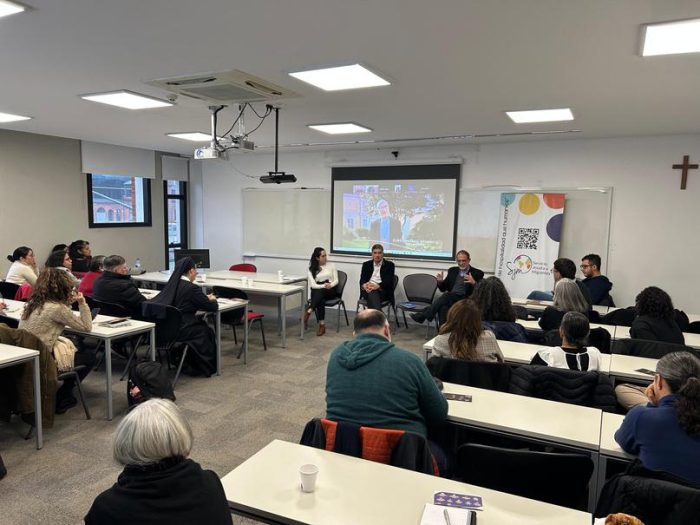
A Vision for the Future
The visit concluded with renewed commitment to “Por Una Cultura De Hospitalidad Que Humanice” (#ForACultureOfHospitalityThatHumanizes), emphasizing that hospitality must not remain in discourse but translate into concrete practices of welcome, respect, and dignity. This commitment reflects JRS Europe’s work toward building “fully inclusive societies founded on the values of solidarity and hospitality”.
As participants committed to continued construction of more just and hospitable territories for all persons in situations of forced mobility, Ares’s visit demonstrated how international exchange strengthens local capacities while contributing to global understanding. The emphasis on territorial approaches – understanding migration from specific local contexts while maintaining universal principles of human dignity – provides a model for contemporary migration ministry.
Continuing the Journey
Ares’s visit to Argentina and Uruguay represents more than diplomatic exchange; it embodies the Jesuit commitment to walking with the most vulnerable. The insights and relationships forged during this visit will undoubtedly enrich European approaches to migration while strengthening continental solidarity in the Americas.
The visit’s success demonstrates that hospitality as praxis – lived commitment rather than abstract principle – can indeed transform both individual lives and social structures.
Through such encounters, the global Jesuit network continues fulfilling its Universal Apostolic Preference to “care for migrants, displaced persons, refugees, and victims of war and human trafficking”, demonstrating that authentic hospitality creates bridges of hope that span continents and transform lives on both sides of every encounter.
